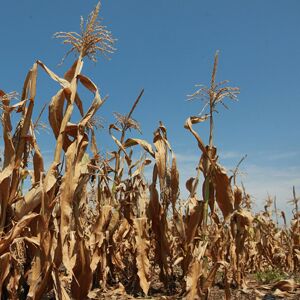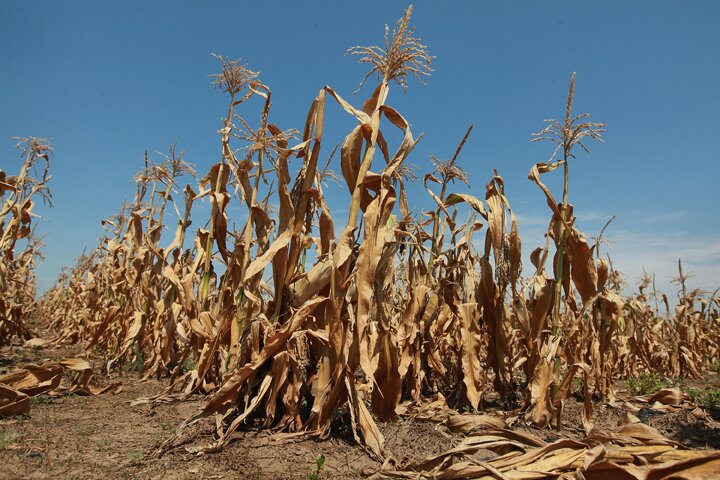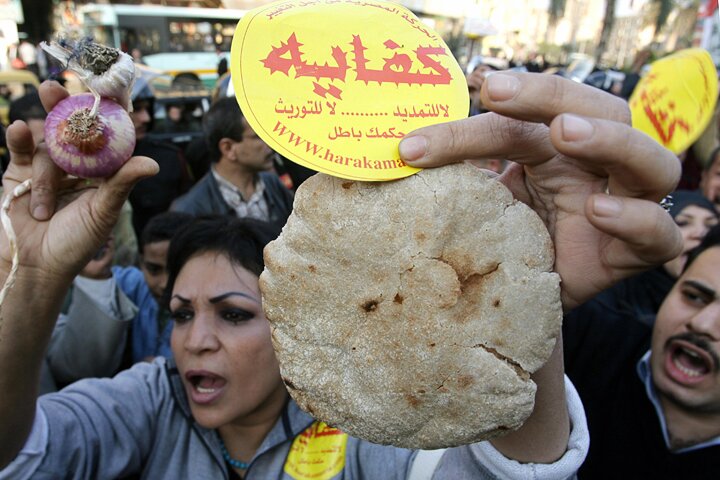
The Global Consequences of America’s Drought
Most people are aware of the historic, unrelenting drought tightening its grip on the United States. But too few are seriously contemplating what this means, not just for America, but for the world.
To most people in wealthier nations, drought simply means ridiculously hot weather, parched lawns and plants, and perhaps a higher-than-normal electric bill. A lack of rain is an annoyance, like an itch, uncomfortable, irritating. Few consider drought to be catastrophic, even fatal.
It wasn’t always this way. There was a time when people understood that severe, prolonged drought meant extreme hardship, suffering and, if it persisted, eventual death. People understood that without rain, crops, fruit trees and pastures died, lakes and watering holes dried up, livestock starved. In the past, when a drought tightened its grip, farmers and their families, and even entire towns and cities, recognized early that they had two options: relocate or starve.
Although we’re in the 21st century, this reality has not changed. Except that unlike yesteryear, people today are ignorant to the fact that extreme drought kills.
Our ignorance stems largely from the fact that very few of us actually grow our own food. These days, cultivating food means strolling through the local, air-conditioned Walmart munching on free food samples while filling an oversize cart with all sorts of bright, colorful, plastic containers. Our food, in its journey from garden to gut, passes through an extensive network of tractors, conveyer belts, factories, blenders, chemical additives, trucks and stores. It’s prepared, processed and packaged, tied, dyed and fried, and in some cases, even buffed and waxed.
For many, this detachment has severed the connection between food production and nature.
But alas! Even in 2012, our food, at least the kind worth eating, still comes from the ground—and it still needs rain.
It’s true that the effects of drought have been somewhat mitigated by the use of wells and sophisticated irrigation systems, by globalizing the responsibility of food production, and by the creation of genetically modified, drought-tolerant seeds. But if the drought is extreme, or persists, such measures fall short. It’s like shooting a bear with a pellet gun: we can slow it down, create time and perhaps temporarily alleviate our fears. But in the end, the inevitable effects of drought will devour us.
And devouring us it is! Did you know that this is America’s worst drought in more than 50 years? Some are comparing conditions to the Dust Bowl conditions of the 1930s. It’s been described as a full-scale catastrophe, a “natural disaster of epic proportions.” By the end of June, more than 50 percent of the U.S. was experiencing moderate to extreme drought. The beginning of July brought no relief, and the plight has only intensified. According to the National Oceanic and Atmospheric Administration (noaa), this summer, 80 percent of the U.S. has been abnormally dry.
The United States Agriculture Department (usda) has already declared more than 1,000 counties in 26 states natural-disaster areas due to drought conditions. More counties are being added to the list every week, and summer’s only half over.
The impact is dramatic and far-reaching. Across America, farmers are slaughtering livestock because there’s not enough pasture, and feed is far too expensive. This may mean lower beef prices in the short term. In the long term, it means most of us will be eating more artificially fed, hormone-filled chicken. Last Friday, the usda reported that America’s cattle inventory was the smallest since the agency began a July count in 1973. In other words, America has as many cows today as it did nearly 40 years ago. Meanwhile, its population has shot up by nearly 100 million.

The same goes for the price of food and the many household items that contain corn, soybeans and wheat. It’s shocking how many items today, from soda to baby food, peanut butter to powdered sugar, talcum to toothpaste, contain corn in some form. It’s the same with wheat and soybeans. Now, according to the United States Drought Monitor, almost 90 percent of America’s corn and soybean crops have been damaged or destroyed as a result of the drought. Get this: The price of corn has jumped 50 percent in the last month, while soybeans are at record prices too. Meanwhile, the price of wheat, another critical staple, has increased 50 percent in the last five weeks.
It’s not hard to see how this will drive up food prices, which would most likely further undermine the economy. In fact, one economist believes the drought will knock 0.5 percent off the U.S. gdp this year.
But think beyond the rising cost of food. What happens if the drought continues to worsen, or even continues into next year, or even the year after?
Anxieties about increasing food prices will be replaced by anxieties about actual shortages of corn, soybeans and wheat!
Consider too that America is responsible for half of the world’s corn, and the majority of the world’s soybean and wheat. Reuters reported yesterday that “the soaring prices in the United States—the world’s largest exporter of corn, soybeans and wheat—has rattled food markets worldwide on fears that food inflation will be imported, food aid or supplies for hungry nations from China to Egypt will not be available, and food riots could occur as in the past.”

The price of corn, wheat and soybeans has already surpassed levels reached during the drought of 2007/08, when rocketing food prices sparked riots in more than 30 countries.
Can you begin to grasp the magnitude of this crisis? In this globalized, interconnected world, persistent, widespread drought in a critical region—such as America’s breadbasket—doesn’t just mean agricultural disaster. It can mean financial and economic malaise, political and social chaos, even large-scale violence and wars.
Can other countries pick up the slack? Perhaps some of it. But it hasn’t stopped raining in much of Russia’s wheat-growing region in recent weeks. The same goes for Brazil. Australia produces an enormous volume of wheat, but it too is experiencing crazy weather.
Meanwhile, the global appetite for food grows.
Major floods and droughts, reduced yields, increased demand all converging at the same moment—it would be the perfect storm!
Some will say I’m arousing unnecessary fear and anxiety. Not true. I’m trying to awaken us to the facts. If you study history, you’ll see many examples of drought and its side effects wiping out economies, sparking unrest, upending governments, setting off wars—and killing untold numbers of people.
This may sound fanciful. But show me the man who can state with authority that this history cannot be repeated. It’s impossible. While science has revolutionized agricultural production, it hasn’t come close to enabling mankind to produce food without water. And until it does, we’ll all be at the mercy of extreme, sustained drought!
So, what’s the solution? How can you escape the drought?
Should we follow the example of Tom Vilsack, the U.S. secretary of agriculture, who told President Obama last week that he gets down on his knees every day and prays for rain?
That would be an admirable start. Of course, it would be pointless if you didn’t sincerely believe in God. Therefore, the process begins with a person acquiring the humility and intellectual objectivity to prove the existence of God, and that the Bible is the truth of God. Then, with your belief in God firm, and your faith in the Bible secure, one would only have to study God’s Word to see how to avoid drought and other natural disasters.
That study might begin in Leviticus 26, a chapter that explicitly instructs us how to receive the blessing of regular rain, followed by abundant crops and overflowing pantries. Notice it: “If ye walk in my statutes, and keep my commandments, and do them; Then I will give you rain in due season, and the land shall yield her increase, and the trees of the field shall yield their fruit. And your threshing shall reach unto the vintage, and the vintage shall reach unto the sowing time: and ye shall eat your bread to the full …” (verses 3-5).
In short, the solution to drought is national obedience.
Of course, that’s not about to happen. Society is so far removed from God that many will find that statement, let alone the thought of personal obedience to law, repulsive. But this instruction applies on an individual level too. God promises those who submit to Him, who actively seek to obey His laws, in letter and spirit, that He will give them peace and security—including physical protection and sustenance.
